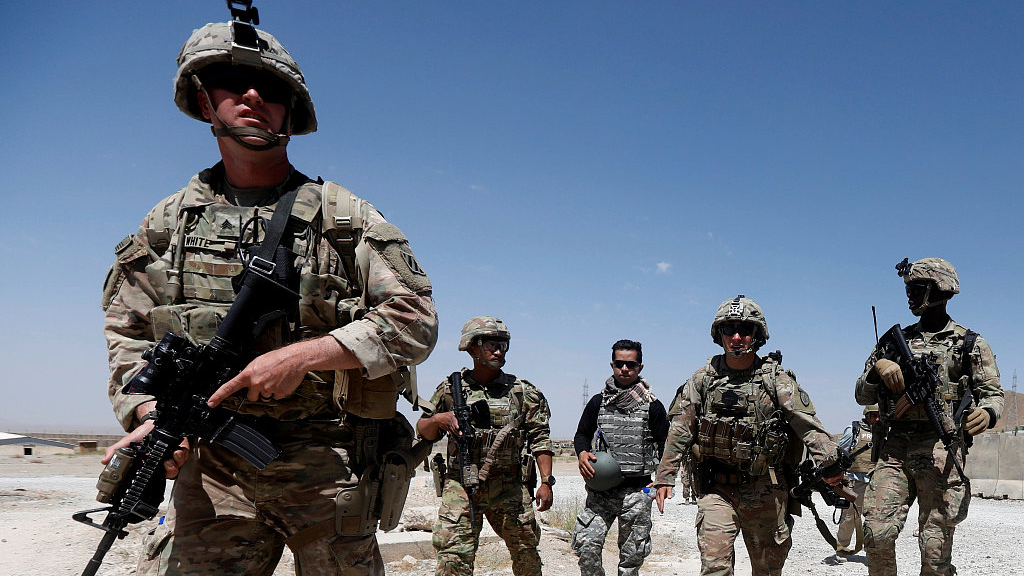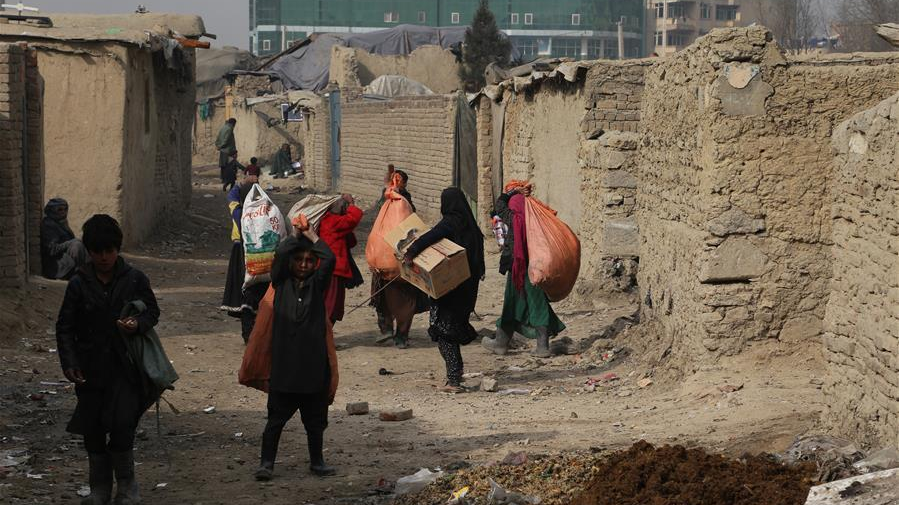
An Afghan boy stands by a grave as he awaits customers to sell water at a cemetery on the the outskirts of Kabul, Afghanistan, July 25, 2020. /AP
An Afghan boy stands by a grave as he awaits customers to sell water at a cemetery on the the outskirts of Kabul, Afghanistan, July 25, 2020. /AP
Editor's note: Hamzah Rifaat Hussain is a former visiting fellow at the Stimson Center in Washington and serves as assistant researcher at the Islamabad Policy Research Institute (IPRI) in Pakistan. The article reflects the author's opinions and not necessarily the views of CGTN.
As violence in Afghanistan has peaked with the Taliban taking hold of two dozen of the country's 387 districts, U.S. President Joe Biden is set to meet his Afghan counterpart alongside chairman of the country's High Council for National Reconciliation Abdullah Abdullah in Washington.
Concomitantly, the foreign ministers of Iran, Turkey and Afghanistan met as part of the Antalya Diplomacy Forum to chart out the future course of the country.
From a realist perspective, the scheduled deliberations in Washington may be of significance for the future of a country wrecked by resurgence in terrorism, the Taliban stamping its authority and a political solution remaining elusive, yet regional frameworks continue to hold great potential towards devising more innovative and inclusive strategies to resolve the Afghan quagmire. The Antalya Diplomacy Forum definitely promises much.

U.S. troops patrol an Afghan National Army (ANA) Base in Logar Province, Afghanistan, August 7, 2018.
U.S. troops patrol an Afghan National Army (ANA) Base in Logar Province, Afghanistan, August 7, 2018.
The reasons are pretty clear. When foreign ministers Javad Zarif, Mevlut Cavusoglu and Mohammad Hanif Atmar met, they immediately stressed on reviving the peace process and devising counter terrorism strategies in the absence of active intervention or backing one entity at the expense of the other which has otherwise threatened peace and tranquility.
The joint statement issued is also an affirmation towards enhancing solidarity between the three countries which are rooted in cultural, religious and historical commonalities which is complimented with a resolve towards promoting regional economic connectivity in the fields of transport, energy, trade and infrastructure.
Note that despite the U.S. commitments to post-withdrawal rebuilding efforts in the country, the American strategy does not factor in regional connectivity arrangements as a variable.
Complimenting this vision is a resolve towards tackling transnational crime, curbing illicit trafficking in narcotic drugs, which is a lifeline for many militant groups in Afghanistan, and promoting an environment conducive to the safe repatriation of Afghan refugees. This multilayered approach contrasts with strategies providing the Taliban with a vacuum to run amok in the absence of a coherent connectivity plan which has an impact on the socioeconomic well-being of the Afghan people and in tackling extremism.
Of course, the joint statement is not a comprehensive antidote to Afghanistan's predicament yet the approach adopted at the Antalya Diplomacy Forum gives it credibility as all three countries involved in deliberations are in close geographical proximity to Kabul. The knowledge of strategic dynamics in Afghanistan is also rooted in historical experiences with Turkey and Iran both supporting the North Alliance (NA) after the 1996 formation of the Islamic Emirate of the country unlike the United States with Washington's policies, resulting in festering differences between the dissolved NA and the Taliban which has defined Afghanistan's landscape today.
Political solutions cannot be devised without due cognizance of on ground dynamics either, especially in a country with a significant Hazara, Uzbek and Tajik population. Instead, by synergizing politicians with diplomats, opinion makers and academics, a non-Pentagon centric approach in the absence of obsessions with maintaining fragile security allows for more innovative approaches in Afghanistan to take hold.

Afghan children are seen at a displaced persons camp in Kabul, Afghanistan, December 18, 2019. /Xinhua
Afghan children are seen at a displaced persons camp in Kabul, Afghanistan, December 18, 2019. /Xinhua
All three countries are impacted by terrorism yet, unlike the U.S., outlook on peace under successive administrations Tehran and Ankara have so far refrained from outright intervention towards pursuing their own national security and strategic objectives at the expense of the Afghan population. While the American war on terror in 2001 directed at uprooting Al-Qaeda resulted in solitary gains, there is also the failure to address the emergence of the Islamic State in the Khorasan Province and systematic violence perpetrated by the Taliban despite principles enshrined in bilateral mechanisms such as the Doha Peace Deal of 2020.
In the latter's case, the Ashraf Ghani government was excluded from dialogue which is an example of how an exclusionary approach can result in lingering differences between all parties to the conflict. Regional countries such as Iran and Turkey on the other hand are aware that a further breakdown in the situation can result in regional blowbacks for which cogent counter terrorism policies complimented with economic solutions are needed.
It is high time that Afghan centric policies are divorced from great power gambits, which have only served to worsen instead of improve conflict-ridden states. The Antalya Diplomacy Forum is one such example in this regard.
(If you want to contribute and have specific expertise, please contact us at opinions@cgtn.com.)

